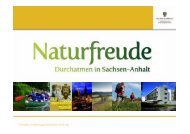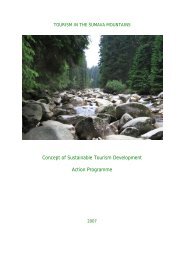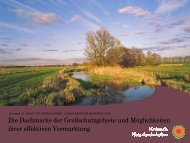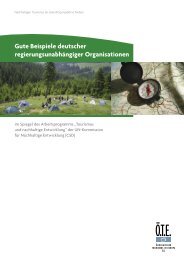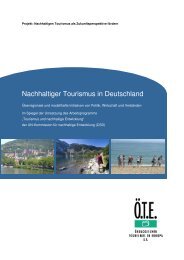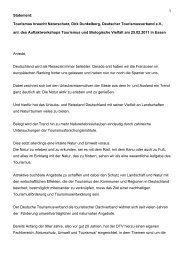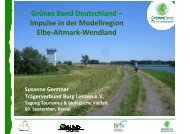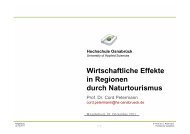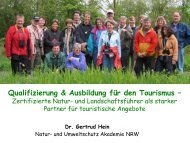Gute Beispiele aus der deutschen Tourismuswirtschaft und den ...
Gute Beispiele aus der deutschen Tourismuswirtschaft und den ...
Gute Beispiele aus der deutschen Tourismuswirtschaft und den ...
Sie wollen auch ein ePaper? Erhöhen Sie die Reichweite Ihrer Titel.
YUMPU macht aus Druck-PDFs automatisch weboptimierte ePaper, die Google liebt.
56<br />
Commission on Sustainable Development,<br />
7th session<br />
New York, 19-30 April 1999<br />
Decision 7/3. Tourism and sustainable development<br />
1. The Commission on Sustainable Development:<br />
(a) Recalls the outcome of the nineteenth special session of the<br />
General Assembly for the overall review and appraisal of the implementation<br />
of Agenda 21, 14 in particular Assembly resolution S/19-2, annex, of 28<br />
June 1997, in paragraph 69 of which the Assembly requested the Commission<br />
on Sustainable Development to develop an action-oriented international<br />
programme of work on sustainable tourism development, to be<br />
defined in cooperation with the World Tourism Organization, the United<br />
Nations Conference on Trade and Development, the United Nations<br />
Environment Programme, the Conference of the Parties to the Convention<br />
on Biological Diversity 15 and other relevant bodies, and stressed that<br />
policy development and implementation should take place in cooperation<br />
with all interested parties, especially the private sector and local and<br />
indigenous communities;<br />
(b) Recalls also that the General Assembly, in its resolution<br />
53/200 of 15 December 1998, proclaimed the year 2002 as the International<br />
Year of Ecotourism and in its resolution 53/24 of 10 November 1998<br />
proclaimed 2002 also as the International Year of Mountains;<br />
(c) Notes with appreciation the outcome of the multi-stakehol<strong>der</strong><br />
dialogue at the current session of the Commission and the progress made<br />
so far by major groups in promoting sustainable tourism development.<br />
2. The Commission decides to adopt an international work<br />
programme on sustainable tourism development, containing the elements<br />
outlined below, and to begin its implementation with appropriate means<br />
and resources, especially for developing countries, which will be reviewed<br />
in 2002 when the 10-year review of progress achieved since the United<br />
Nations Conference on Environment and Development will be carried out.<br />
3. The Commission urges Governments:<br />
(a) To advance sustainable tourism development, inter alia,<br />
through the development and implementation of policies and national<br />
strategies or master plans for sustainable tourism development based on<br />
Agenda 21, which will encourage their tourism industry, assist in attracting<br />
foreign direct investment and appropriate environmentally so<strong>und</strong> technologies,<br />
and also provide focus and direction for the active participation<br />
of major groups, including national tourism councils and, as appropriate,<br />
tourism agencies and organizations, and the private sector as well as<br />
indigenous and local communities;<br />
(b) To consult, as appropriate, with all major groups and local<br />
communities in the tourism development process, including policy formulation,<br />
planning, management and sharing of benefits, which could reflect<br />
the need to harmonize the relationship among the people, the community<br />
and the environment;<br />
(c) To work in partnership with major groups, especially at the<br />
local level, to ensure active participation in tourism-related planning and<br />
development;<br />
(d) To un<strong>der</strong>take capacity-building work with indigenous and local<br />
communities in or<strong>der</strong> to facilitate their active participation, at all levels of<br />
the tourism development process, including transparent decision-making<br />
and sharing of benefits, and to create awareness of the social, economic<br />
and environmental costs and benefits that they are bearing;<br />
(e) To create the appropriate institutional, legal, economic, social<br />
and environmental framework by developing and applying a mix of instruments,<br />
as appropriate, such as integrated land-use planning and coastal<br />
zone management, economic instruments, social and environmental<br />
impact assessment for tourist facilities, including gen<strong>der</strong> aspects, and<br />
voluntary initiatives and agreements;<br />
(f) To maximize the potential of tourism for eradicating poverty<br />
by developing appropriate strategies in cooperation with all major groups,<br />
and indigenous and local communities;<br />
(g) To welcome the major groups’ agreement to promote sustain-<br />
able tourism development through music, art and drama and to participate<br />
in such educational activities;<br />
(h) To facilitate destination-specific in-flight educational videos<br />
and other materials on sustainable development in relation to tourism<br />
and to encourage airline carriers to routinely screen such videos on all<br />
international and long-haul domestic routes;<br />
(i) To promote a favourable framework for small and mediumsized<br />
enterprises, the major engine for job creation in the tourism sector,<br />
by reducing administrative bur<strong>den</strong>s, facilitating access to capital and<br />
providing training in management and other skills, in recognition of the<br />
employment potential of sustainable tourism development;<br />
(j) To take strong and appropriate action, through the development<br />
and enforcement of specific legislation/measures, against any kind<br />
of illegal, abusive or exploitative tourist activity, including sexual exploitation/abuse,<br />
in recognition of the fact that such activities have particularly<br />
adverse impacts and pose significant social, health and cultural threats,<br />
and that all countries have a role to play in the efforts to stamp them out;<br />
(k) To participate in international and regional processes that address<br />
issues relevant to sustainable tourism development; to consi<strong>der</strong> the<br />
ratification or adoption, and promote the implementation and enforcement,<br />
as appropriate, of standards or guidelines relevant to the travel and<br />
tourism industry, such as in the labour and health fields; and to support<br />
initiatives, especially through organizations like the International Labour<br />
Organization and the World Health Organization, that would make an<br />
early and positive contribution to sustainable tourism development;<br />
(l) To support appropriate measures to better inform tourists<br />
about cultural, ecological and other values and provide accurate information<br />
on the safety of tourist destinations, so as to enable consumers to<br />
make informed choices.<br />
4. The Commission calls upon the tourism industry:<br />
(a) To develop environmentally, socially and culturally compatible<br />
forms of tourism and to continue the development and implementation<br />
of voluntary initiatives in support of sustainable tourism development,<br />
bearing in mind that such forms of tourism and initiatives should meet,<br />
or preferably exceed, relevant local, national, regional or international<br />
standards;<br />
(b) To further commit itself to the goal of sustainable tourism<br />
development by working towards guiding principles and objectives for<br />
sustainable tourism development and information for tourists on ecological<br />
and cultural values in destination regions;<br />
(c) To further develop voluntary eco-efficiency and appropriate<br />
management systems to save costs and to promote sustainable forms of<br />
tourism;<br />
(d) To take effective steps to reduce the volume of waste associated<br />
with travel and tourism activities;<br />
(e) To “design with nature” in collaboration with planning authorities,<br />
by using low impact designs, materials and technologies, so as not to<br />
damage the environmental or cultural assets that tourists seek to experience<br />
and that sustain the local community, and to un<strong>der</strong>take measures to<br />
restore tourist destinations with degraded environments;<br />
(f) To distance itself publicly from illegal, abusive or exploitive<br />
forms of tourism;<br />
(g) To meet or preferably exceed relevant national or international<br />
labour standards.<br />
5. The Commission invites, as appropriate, Governments and<br />
major groups, as well as the United Nations system, in close collaboration<br />
with the World Tourism Organization, while building on relevant work<br />
carried out by the United Nations Environment Programme, the United<br />
Nations Educational, Scientific and Cultural Organization, the United<br />
Nations Conference on Trade and Development, the International Labour<br />
Organization and the United Nations Development Programme and un<strong>der</strong><br />
the Convention on Biological Diversity and other relevant conventions<br />
14 Report of the United Nations Conference on Environment and Development, Rio de Janeiro, 3 - 14 June 1992, vol. I, Resolutions Adopted by the Conference (United Nations<br />
publication, Sales no. E.93.I.8 and corrigendum), resolution 1, annex II.<br />
15 See United Nations Environment Programme, Convention on Biological Diversity (Environment Law and Institution Programme Activity Centre), June 1992




